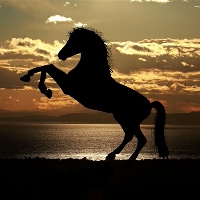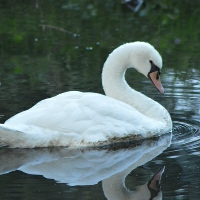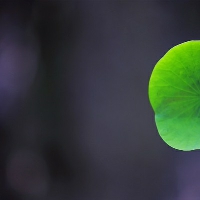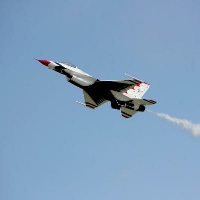Love of Life
two men walked slowly, one after the other, through the shallow1 water of a stream. all they could see were stones and earth. the stream ran cold over their feet. they had blanket packs on their backs. they had guns, but no bullets2; matches, but no food.
suddenly the man who followed fell over a stone. he hurt his foot badly and called: "hey, bill, i've hurt my foot." bill continued straight on without looking back.
the man was alone in the empty land, but he was not lost. he knew the way to their camp, where he would find food and bullets. he struggled to his feet and limped3(跛行) on. bill would be waiting for him there, and together they would go south to the hudson bay company. he had not eaten for two days. often he stopped to pick some small berries4 and put them into his mouth. the berries were tasteless, and did not satisfy, but he knew he must eat them.
in the evening he built a fire and slept like a dead man. when he woke up, the man took out a small sack5. it weighed fifteen pounds. he wasn't sure if he could carry it any longer. but he couldn't leave it behind. he had to take it with him. he put it back into his pack, rose to his feet and staggered6 on.
his foot hurt, but it was nothing compared with his hunger, which made him go on until darkness fell. his blanket was wet, but he knew only that he was hungry. through his restless7 sleep he dreamed of banquets8(宴会) and of food. the man woke up cold and sick, and found himself lost. but the small sack was still with him. as he dragged himself along, the sack became heavier and heavier. the man opened the sack, which was full of small pieces of gold. he left half the gold on a rock.
eleven days passed, days of rain and cold. one day he found the bones of a deer. there was no meat on them. the man broke the bones and he sucked and chewed on them like an animal. would he, too, be bones tomorrow? and why not? this was life. only life hurt. there was no hurt in death. to die was to sleep. then why was he not ready to die? he, as a man, no longer strove9. it was the life in him, unwilling10 to die, that drove him on.
one morning he woke up beside a river. slowly he followed it with his eyes and saw it empting into a shining sea. when he saw a ship on the sea, he closed his eyes. he knew there could be no ship, no sea, in this land. a vision11, he told himself. he heard a noise behind him, and turned around. a wolf, old and sick, was coming slowly toward12 him. this was real, he thought. the man turned back, but the sea and the ship were still there. he didn't understand. had he been walking north, away from the camp, toward the sea? he stood up and started slowly toward the ship, knowing full well the sick wolf was following him. in the afternoon, he found some bones of a man. beside the bones was a small sack of gold, like his own. so bill had carried his gold to the end. he would carry bill's gold to the ship. ha—ha! he would have the last laugh on bill. his laughing sounded like the low cry of an animal. the wolf cried back. the man stopped suddenly and turned away. how could he laugh about bill's bones and take his gold?
the man was very sick, now. he crawled13 about, on hands and knees. he had lost everything—his blanket, his gun, and his gold. only the wolf stayed with him hour after hour. at last he could go on no further. he fell. the wolf came close to him, but the man was ready. he got on top of the wolf and held its mouth closed. then he bit it with his last strength. the wolf's blood streamed into his mouth. only love of life gave him enough strength. he held the wolf with his teeth and killed it, then he fell on his back and slept.
the men on the ship saw a strange object lying on the beach. it was moving toward them—perhaps twenty feet an hour. the men went over to look and could hardly believe it was a man.
three weeks later, when the man felt better, he told them his story. but there was one strange thing—he seemed to be afraid that there wasn't enough food on the ship. the men also noticed that he was getting fat. they gave him less food, but still he grew fatter with each day. then one day they saw him put a lot of bread under his shirt. they examined his bed and found food under his blanket. the men understood. he would recover from it, they said.
 也自风雅 2024-04-19 12:59:15
也自风雅 2024-04-19 12:59:15








